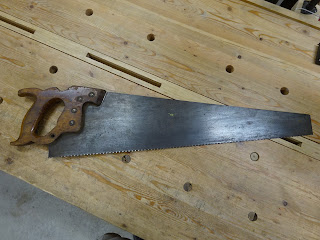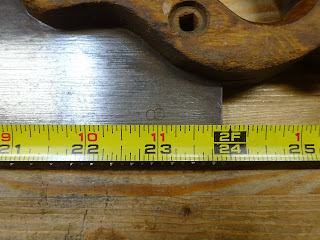I came across this handsaw a few years ago at a garage sale. I wasn't going to take them, but the guy saw that I was interested and just wanted to be rid of the two saws he had so he asked me to take them. Who am I to refuse such a request?
 |
| Disston D-23 in as-found condition |
 |
| The right side |
I love using my 100 year old Disston D-115 (that I also got for free at a garage sale) for cross-cuts, so this D-23 has been in a cabinet awaiting some restoration. According to Eric von Sneidern's Disstonian Institute website, the D-20 series saws were introduced in 1911 and they were a mid-priced line, not thought to be much of a collector's item (not that I care about collecting). But they were good saws nonetheless. Based on the etch and the medallion, this saw is likely from the 1940-1947 time frame. The D-23 is a straight backed, narrow width saw.
First, some documenting of current condition. This is a 24" saw (which I guess technically makes it a panel saw) with 8 ppi, filed cross-cut. I rarely see handsaws other than 26". I'm 5' 11" tall with arm length commensurate to that height, so a 26" saw fits me pretty well. But I've wanted a shorter saw - I have a feeling I'll like the length.
 |
| Length is just under 24" and filed 8 ppi, like most cross-cut saws I come across |
The etches are not in the greatest condition, so I'll be very careful when cleaning up the plate.
 |
| All the etches |
 |
| ESTABLISHED 1840 HENRY DISSTON & SONS INC D-23 PHILADELPHIA USA LIGHTWEIGHT |
 |
| REG. U.S. PAT. OFF. M DE F M IND RGTRADA |
 |
| "For Beauty, Finish and Utility this Saw cannot be Excelled" Henry Disston |
The plate is taper ground. Just above the teeth, the plate is 0.036" thick at toe, tapering to 0.040" at the handle end. Along the back of the plate, it is 0.024" at the toe, tapering to 0.037 at the handle.
The handle is in good condition, though it is missing one nut/bolt. A lot of finish is flaking off. I can't tell what kind of wood it is, but Disston shifted from apple wood to other hardwoods about the time this saw was made.
 |
| Interesting pattern of carved leaves - Notice how a small "branch" goes above the medallion. |
 |
| The top of the handle is "closed" - there is no slot showing for the plate |
 |
| The saw nuts / bolts look like brass |
 |
| The 13/16" diameter medallion |
Next time I'll get into the rehab.
No comments:
Post a Comment